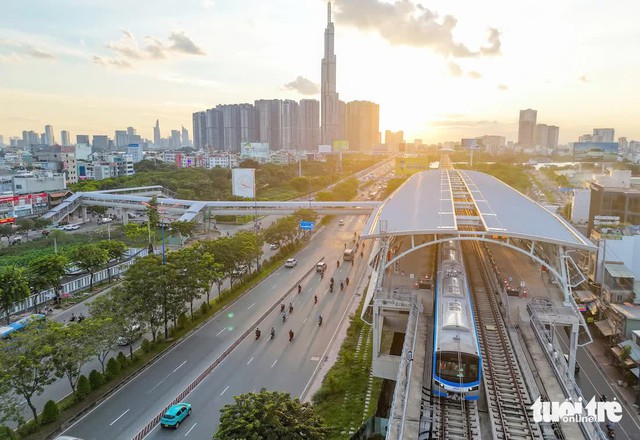
Metro line No.1 in Ho Chi Minh City began official operations in December 2024. Photo: Chau Tuan / Tuoi Tre
The municipal administration has tasked the Department of Home Affairs with working alongside relevant agencies to evaluate international models in which private enterprises directly invest in and operate urban railway systems, rather than relying on government-run operators.
The directive comes as the city implements Notice No. 1 from the city’s steering committee for urban railway development, urging relevant departments to adopt a new planning vision in light of a proposed expansion of city boundaries to include neighboring Binh Duong and Ba Ria-Vung Tau Provinces.
The Department of Construction has been asked to review the city’s railway network master plan for the 2021-30 period, with a long-term vision to 2050 and beyond.
Adjustments are expected to integrate technical infrastructure, including underground spatial planning, while streamlining investment procedures and aligning with multimodal transport systems such as buses, roadways, and waterways.
The Department of Finance has been assigned to formulate funding strategies for the expanded urban rail system, including the creation of a dedicated urban rail investment fund.
This fund would explore public-private partnerships and other non-state capital sources to diversify funding and meet ambitious rollout timelines.
Departments are being encouraged to collaborate with ministries to propose legal reforms and pilot policies—potentially submitted to the law-making National Assembly for approval.
The Department of Home Affairs has to work with Ho Chi Minh City Urban Railway No. 1 Co. Ltd., which operates the city’s first metro line, to assess private-led rail operation models, drawing on global best practices and adjusting them to local conditions.
Based on findings, the Department of Home Affairs will propose a suitable model for investment and operation aligned with the city’s long-term development vision.
Meanwhile, the municipal Management Authority for Urban Railways is responsible for accelerating preparations for new urban railway projects.
The Management Authority for Urban Railways will appoint capable domestic and international consultants and form expert groups to oversee the projects’ implementation.
For metro line No. 2, which will stretch from Ben Thanh Market in District 1 to the Tham Luong Bridge in District 12, the city will apply direct contractor appointment for upcoming packages—especially consultancy services—ensuring legal compliance, transparency, and reasonable costs.
According to an official plan, Ho Chi Minh City will have 12 metro lines spanning 510 kilometers.
As per the National Assembly’s Resolution 188, the city aims to implement seven lines stretching 355 kilometers within 10 years using public investment.
Private-sector-driven lines are also being promoted, including those connecting the city center with Can Gio District and the Thu Thiem-Long Thanh route.
Regarding Binh Duong Province, it has planned 12 lines totaling 305 kilometers.
Ba Ria-Vung Tau Province will have three lines covering 125 kilometers.
Following an ongoing administrative merger, the expanded city may oversee close to 1,000 kilometers of urban rail, excluding national railway segments currently under central government management.


Max: 1500 characters
There are no comments yet. Be the first to comment.